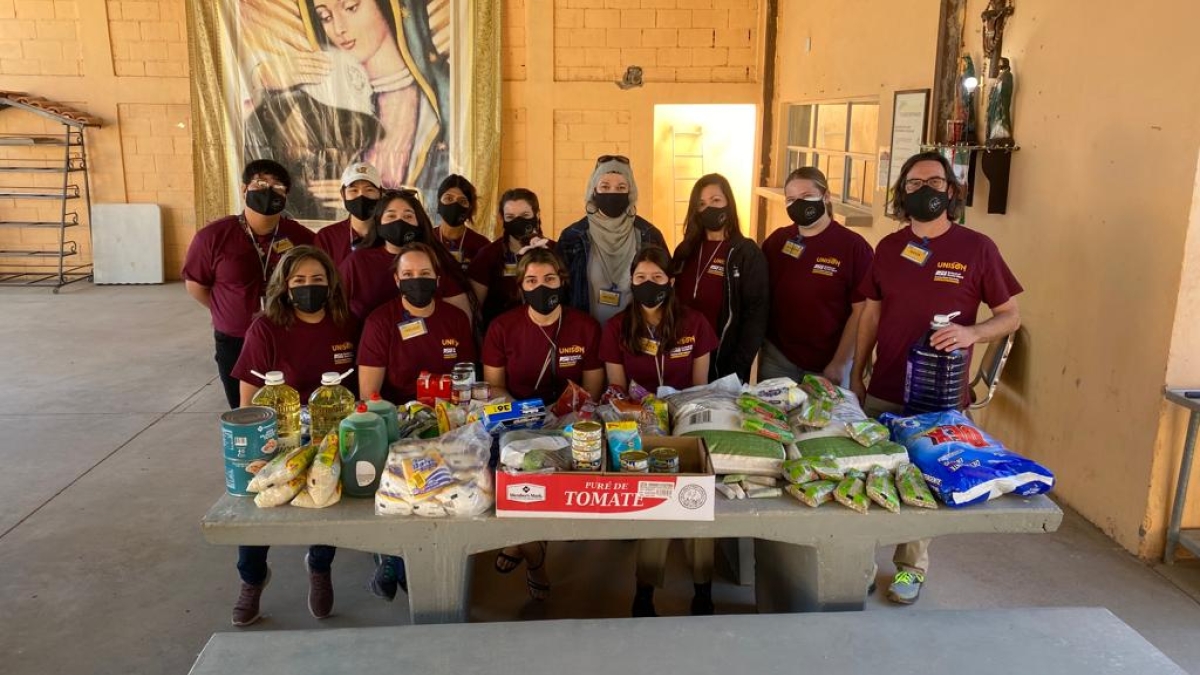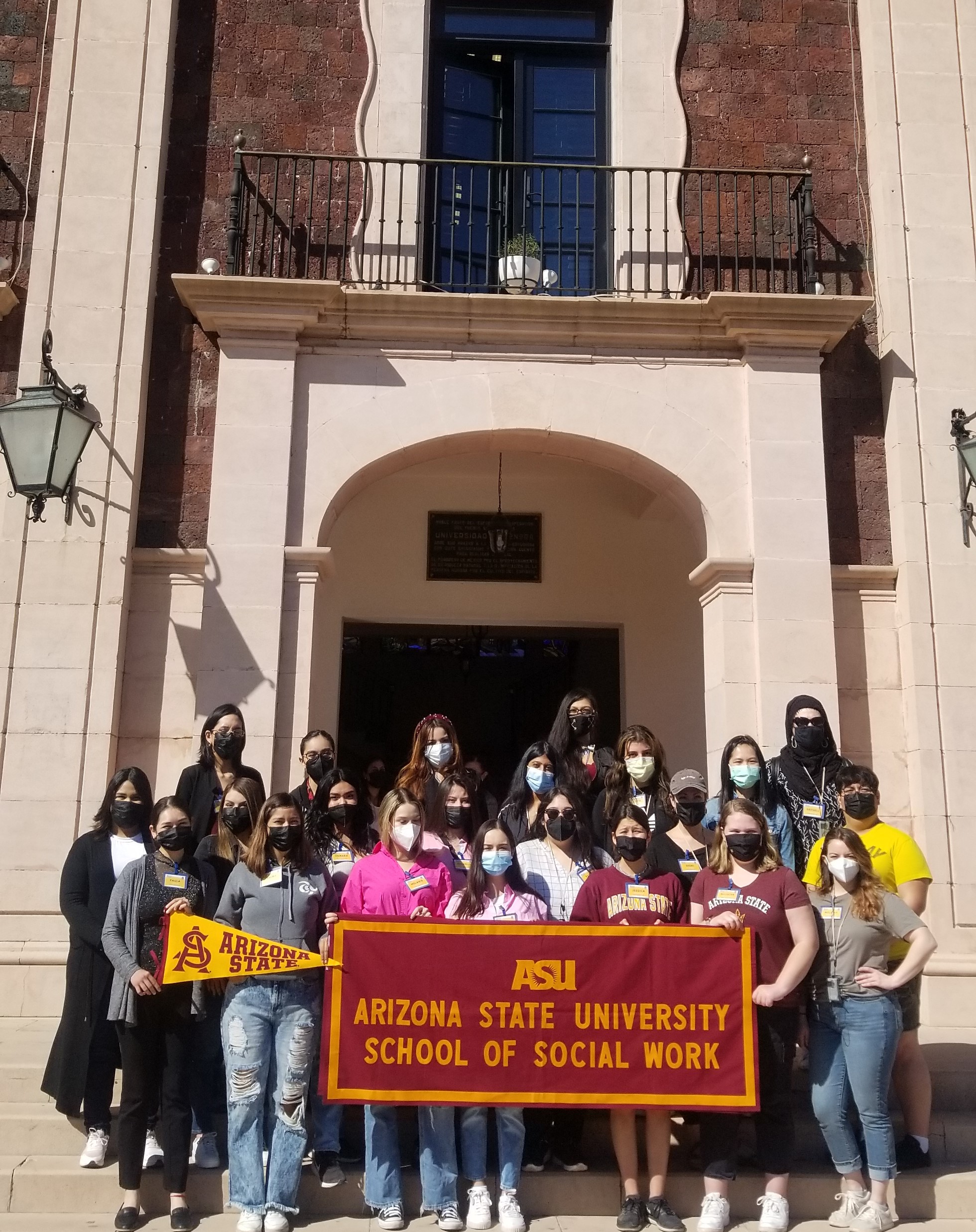Social work students visit borderlands to learn about immigration issues, border culture

ASU students pose for a group photo behind a table full of donated food at Casa de Migrantes in Hermosillo, Sonora, in Mexico. Photo by Ivelisse López-González
Textbooks, lectures and news reports can only go so far to describe the migrant experience and the role of those who provide services to this population. What’s often missing is the human perspective — and the empathy one gains from walking on a trail near the Arizona-Sonora border in the literal footsteps of individuals who have traveled this path in hopes of a new life.
The personal aspects of immigration — who migrants are and what they feel, and who the people are who help them survive – came into sharper focus for Arizona State University students this spring on two separate trips to the borderlands, each led by a School of Social Work faculty member.
Heather Voelkel, School of Social Work Tucson program coordinator and lecturer, led five students to the Arizona town of Douglas and the neighboring community of Agua Prieta, Sonora, hosted and facilitated by the group’s partnering organization, Frontera de Cristo, and financially supported by members of the School of Social Work Tucson Community Advisory Board, the Community Foundation for Southern Arizona and the Presbyterian Campus Ministry.
Instructor Ivelisse López-González, faculty director of ASU's Global Intensive Experiences' Pathways to Global Social Work program, accompanied 10 students to the Sonoran state capital of Hermosillo on a Pathways to Social Work trip titled “Immigration, Social Justice and Community.”
One of López-González’s students, Sheri Sturgeon, an undergraduate student studying community, advocacy and social policy, said she feels “like a different woman” after taking the trip.
“This trip exceeded all expectations. It gave me clarity in my career/academic path. I have a different perspective and understanding of migrant workers and what they endure, what the families, women and children endure,” Sturgeon said. “Being immersed in this culture was beautiful and life-changing. I feel more at peace and less uptight about little things."
‘Transformative experience’ included walk on migrant trail
Voelkel said her students found their trip to be a transformative experience. One part that was particularly memorable: walking a migrant trail near the border.
“(The walk) gave them a firsthand understanding of the personal risk that migrants face as they try to cross over,” Voelkel said. “We had dinner with migrants staying at Centro de Atencion al Migrante Exodus emergency shelter and learned of some the horrific experiences that forced the migrants to leave their homes and the harrowing journey they undergo while trying to get to the U.S. border to apply for asylum.”
Students conducted “an in-depth history of border policy while also comparing the U.S. side of the border wall, which consisted of three layers of fencing, razor wire, high speed access roads, cameras and many border agents, to the Mexico side, which had murals, tree-lined pedestrian walkways and memorials commemorating folks who had died,” Voelkel said.
Ricardo Sanchez, a social work master’s degree student, called the desert walk on the migrant trail to the U.S. “harsh and dangerous.” He said volunteering at Agua Prieta was “a life-changing and career-changing event” because he learned the history of the wall and how it came to be.
“It was eye-opening,” Sanchez said. “The rehab center we visited was incredibly well-run and had a feel of a community helping each other through their dark times. The rehab center is a nonprofit center, and they utilize every tool they have to keep it running, give clients a bed, and feed them three meals a day.”
Social work undergraduate student Renee Brown said she learned the history of the border wall “and how policies have affected the people of Mexico and their need for a better life. My heart was also opened to the plight of migrants, whether from Mexico or other countries traveling through Mexico to the U.S.,” she said.
“I was allowed to experience a small part of what people experience as they try to live their life in Mexico or try to leave there to get to the U.S. for a better life,” Brown said. “Lastly, I learned how beautiful the people are in hearts and minds. They want to help each other, love each other and give of themselves to help each other live a better life.”
Students volunteered at a cooperative that focuses on helping women attain financial stability through gardening, sewing and carpentry, as well as running a whole day of activities for a neighborhood after-school center.
Hermosillo trip moved students to develop ‘a new, profound awareness’
López-González said the Hermosillo trip allowed her students to develop “a new, profound awareness about immigration, social services south of the border and Mexican culture.”
ASU students participated in conversations with students from the Universidad de Sonora (UNISON). Topics included immigration, agricultural fieldwork and local Indigenous communities.
ASU social work students visit the Universidad de Sonora (UNISON) in Hermosillo. Photo by Ivelisse López-González
The interactions provided “an invaluable and unique component of this program,” López-González said. “These conversations transcend what can be taught in the classroom and contribute to helping students develop their intercultural and interpersonal skills.”
Students delivered lunch to migrants standing by railroad tracks and watched as a train passed by, López-González said.
“Witnessing the migrants’ expression of hope and gratitude had a tremendous impact on our students,” she said. “This experience, along with class discussions led by Dr. Jose Rodriguez from UNISON and (Associate Professor) David Androff from ASU, unveiled a reality about immigration that emotionally moved many of the students and served to expand their outlook on border and immigration issues.”
Social work master’s degree student Kathryn Hua said meeting and collaborating with UNISON students was the trip’s most important takeaway for her.
“I think that is the most valuable piece, to get to hear from other social work students in another country,” Hua said.
Social work master’s degree student Gloria Geeso said, “It was heartwarming and reassuring to know that there are people working to make the world a better place and doing their part all over. I had a great time on this trip, and got the opportunity to learn so much about social work in Mexico and bond with other students with similar passions."
López-González said some of the trip’s most valuable learning opportunities arose from site visits, “where students had firsthand experiences by being connected to local agencies and their community work."
“This served to elevate the students' understanding of concepts discussed in lectures,” she said.
The visits included a local farm, where students learned the impact rigorous fair-trade standards have on farm workers’ well-being, including access to health care and social workers; a soup kitchen, where students discovered grassroots efforts to maintain it as they served lunch to migrants; and how the lack of internet service has affected local Indigenous children, setting back their educational progress about two years.
López-González’s students received one credit hour for their participation. The experience also provided a benefit with much more impact.
“Living in an increasingly interconnected world, students expanded their perspective as global citizens,” López-González said.


